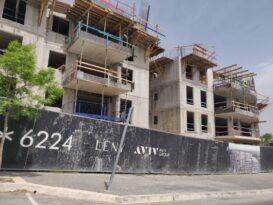A recent court ruling explores whether a temporary mandatory injunction can be issued against apartment owners who initially agreed to a pinui-binui project but later refused to sign essential banking documents. The court sided with the developer, granting the injunction to ensure the project’s progress and protect the interest of all involved parties. The decision highlights the judiciary’s willingness to intervene when a small minority hinders a development project supported by the majority.
Edited by Adv. Sapir Yechezkel with the assistance of Gal Hadad
This article discusses whether a court can issue a temporary mandatory injunction—a rare legal order that forces someone to do something immediately, before the full court case is even decided. The case involved a pinui-binui (urban renewal) project, and the question was: can residents who previously agreed to take part in the project be legally forced to sign bank documents and leave their apartment early, even though the final ruling hasn’t been made yet? The court weighed the interests of the developer and the majority of homeowners—who were ready to move forward—against a small group of residents who changed their minds and were now holding up the entire project.
What is a Temporary Mandatory Injunction?
Under Israeli law (specifically Regulation 94 of the Civil Procedure Regulations), a temporary injunction is a legal tool meant to protect a party’s rights during a court case, ensuring that by the time a final ruling is given, the winning side can still benefit from the outcome. A mandatory injunction goes a step further by requiring someone to take action—like moving out or signing documents—and is rarely granted before a full trial, as it alters the status quo. In this case, however, the court made an exception.
Case Background:
The Azorim construction company filed a legal request to force a pair of apartment owners in Givat Shmuel to sign bank-related documents and vacate their apartment. This was part of a larger pinui-binui project, in which old buildings are demolished and replaced with new ones, and all residents are rehoused in upgraded units. The couple had already signed the agreement—after being taken to court as “refusing residents”—but were now refusing to cooperate.
At this point, Azorim had already signed agreements with 111 other homeowners, paid over 30 million shekels in city fees and permits, received demolition and construction permits, secured bank financing for the project, and even began marketing the new apartments to buyers. They had also hired a contractor to begin construction.
Now, the couple in question refused to move out or sign the bank paperwork unless their new demands were met—including getting an apartment on a higher floor, receiving 100,000 shekels in legal fees to pay their son who represented them, compensation for higher maintenance fees, and other benefits not mentioned in the original agreement. Azorim claimed this refusal was jeopardizing apartment sales and putting the entire project at risk. The residents argued that the company acted in bad faith, broke promises, and kept important information from them. They said they would only sign if their new conditions were met.

Court Decision:
The court agreed with Azorim and granted the temporary mandatory injunction. While the judge acknowledged that such orders aren’t common—especially ones that force people to take action—the court explained that in this case, not issuing the order would actually violate the original contract everyone had agreed to. The judge emphasized that the legal agreement between the parties, not just the physical reality, is what needed to be protected.
The court ruled that Azorim had provided enough evidence to show they had a strong legal case. It also said that the balance of fairness (known in legal terms as the “balance of convenience”) was clearly in Azorim’s favor. The order was necessary to keep the project moving and to prevent major damage to the developer and other homeowners.
The judge pointed out that the residents weren’t denying their obligation to move out—they just wanted a better deal. But changing the terms after the fact, especially when others are affected, is not acceptable. The court also criticized the couple for not acting in good faith.
To make sure the residents’ rights were protected, the court ordered Azorim to reserve two higher-floor apartments (on the 9th and 4th floors) for them until the final decision is made. Azorim also had to deposit a 150,000 shekel bank guarantee or cash, in case the residents suffered financial harm. The residents were ordered to sign the documents within 7 days and move out within 90 days after receiving formal notice from Azorim. They were also ordered to pay 8,000 shekels in legal fees.
Case: Azorim v. Nahaissi & Har Tzion, Tel Aviv District Court 24789-12-24
Gindi Caspi & Co. is one of Israel’s most prominent law firms in real estate, planning and zoning, and urban renewal. With decades of extensive experience handling complex and large-scale real estate transactions, the firm is consistently ranked among the top-tier firms in these fields by all major rating companies. Notably, the international LEGAL 500 recognized Gindi Caspi & Co. as a Leader in real estate, planning, and zoning and highlighted Adv. Ziv Caspi as a Leading Individual in Israeli law. The firm has also received numerous accolades, including ranking among the top real estate law firms (Dun’stars) in planning, zoning, and urban renewal. It was honored as a “pillar and cornerstone in fulfilling the nation’s vision for building and settling the land.” For five consecutive years, the firm has been ranked first in Israel in the field of urban renewal.
For inquiries, contact law@gindi-caspi.co.il.







